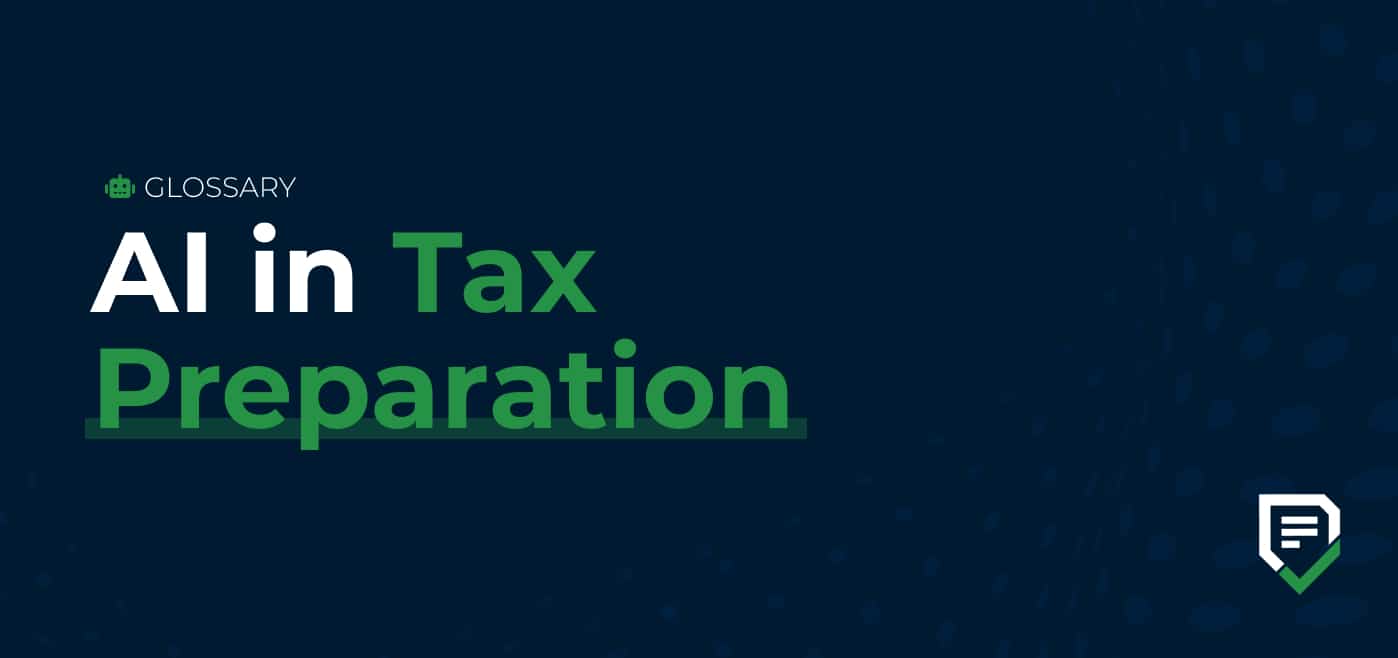Tax season is one of the most stressful times for accounting professionals. During this busy accounting period, you are overwhelmed with analyzing complex tax data, ensuring compliance with ever-changing regulations, receiving and verifying client documents on time, and filing taxes before deadlines.
Managing all these responsibilities is intense, time-consuming, and demanding. But what if there was a way to ease the stress of tax season and handle the workload more efficiently?
That’s where artificial intelligence (AI) comes in. It automates manual tasks such as performing complex tax research, simplifying new tax changes and data extraction.
What is AI in Tax Preparation?
AI in tax preparation refers to using artificial intelligence to streamline various tax preparation workflows. It can handle data extraction, detect compliance risks, provide real-time tax insights, and assist with client communication, allowing you to focus on higher-level work rather than administrative burdens.
How is AI Used in Tax Preparation?
Automated Data Extraction
AI can extract relevant information from documents such as W-2s, 1099s, and receipts and input it into tax forms. This automated process eliminates manual data entry, reduces mistakes and improves accuracy.
Error Detection
AI algorithms can identify inconsistencies, missing information, or potential errors in tax returns, making them accurate and compliant.
Document Organization and Categorization
AI can help organize tax documents by categorizing them based on relevance, making retrieval and review quicker and easier. For instance, it can group receipts by expense type, simplifying your clients’ tax filings from the tax preparer checklist for clients.
Tax Calculation Assistance
Equipped with built-in algorithms, AI can assist in accurate tax calculations, validate figures against tax regulations, and flag potential issues before filing.
Chatbots for Customer Support
AI-driven chatbots improve customer service by providing timely answers to routine tax-related queries, improving client response times.
Predictive Analytics
AI can analyze large datasets to predict tax liabilities and identify opportunities for tax savings. It can also use historical data to predict future tax liabilities and help with tax planning. As a result, tax preparers can offer clients valuable insights that maximize deductions and optimize their tax strategies.
Personalized Recommendations
AI can analyze your client’s financial situation and provide personalized tax-saving recommendations. For example, it might suggest specific deductions or credits they are eligible for but unaware of.
Why AI in Tax Preparation is Essential
1. Increases Efficiency & Productivity
AI automates data entry, document sorting, and calculations, reducing stress and workloads during the busy season. You can complete routine tasks in minutes, leading to quicker turnarounds and the capacity to serve more clients,
2. Reduced Errors & Enhanced Accuracy
AI reduces human errors in data entry, calculations, and compliance with tax laws. It can also identify inconsistencies or missing information, leading to more accurate tax filings.
3. Save Costs
Automation reduces the need for manual labor, leading to cost savings. By streamlining your operations, you can allocate resources toward client engagement and other high-value services, giving your business room to thrive.
Additionally, AI can reduce the need for extensive staff during peak tax seasons, as it can effectively handle a heavier workload.
4. Personalized Client Services
Clients expect tailored services that align with their unique financial situations. With AI-driven insights, you can provide personalized recommendations which improve client satisfaction and loyalty.
5. Improved Compliance & Risk Assessment
AI systems can stay current with the latest tax laws and regulations, ensuring compliance and reducing the risk of penalties. By analysing historical tax data, machine learning accounting models identify discrepancies that could trigger audits.
Features of AI Tax Preparation Tools
When selecting AI tax preparation software, look for features that can improve your operational efficiency.
- Automated Data Entry: AI-powered tax tools use optical character recognition (OCR) and machine learning algorithms to extract information from various tax documents
- E-Filing Capabilities: Many AI-driven tax preparation solutions offer integrated e-filing options, allowing you to submit returns electronically, significantly speeding up processing times and reducing client waiting periods.
- Error-Checking Algorithms: Advanced AI algorithms can detect inconsistencies and errors in your tax filings. This feature allows you to rectify issues before submission, thus reducing audit risks and enhancing client trust.
- Integration with Accounting Systems: Choose software that seamlessly integrates with your existing accounting software to ensure data flows between platforms and provide a comprehensive view of your financial processes.
- Client Portals: Look for platforms that offer secure client portals. These portals enable your clients to upload documents easily and track the status of their tax returns in real time.
Problems with AI in Tax Preparation
Data Security
According to a Thomson Reuters survey, 37% of tax and accounting professionals cite data security as their top concern for not using AI.
The reason isn’t far-fetched; tax preparation involves handling sensitive personal and financial data. Any breach or mishandling of this information could lead to severe financial and reputational consequences. Implement robust security measures to prevent data breaches and unauthorized access.

Sam S., CPA
Brianna Goodman
Angela Brewer
Lack of Human Oversight and Interpretability
AI can automate tax calculations and document processing, but human expertise is still needed to interpret complex tax scenarios. Additionally, AI’s decision-making process can sometimes be opaque, making it difficult to understand how conclusions are reached. This bottleneck may raise concerns about accuracy and fairness.
Dependence on Quality Data
AI’s effectiveness relies on high-quality input data. Garbage in, garbage out, if the data fed into AI systems are inaccurate or incomplete, the outcomes will be flawed. Develop strategies to ensure data integrity and regularly audit your data sources.
AI Bias and Decision-Making Errors
If the data used to train AI models is biased, it may produce biased outcomes, potentially affecting certain groups of taxpayers. The technology could also make incorrect assumptions about tax deductions, credits, or risk factors, leading to unfair outcomes or miscalculations. Therefore, regular audits of AI models are necessary to identify and correct biases.
Limited Handling of Complex Tax Scenarios
AI excels at automating routine tax tasks but may struggle with highly complex tax cases, such as multi-jurisdictional tax filings, business restructuring, or unique deductions. In such cases, human tax professionals remain essential.
Client Acceptance and Trust
Some clients may hesitate to trust AI systems with their sensitive financial information. So, it’s crucial to communicate, build trust, and show them the benefits of AI. They must feel confident that their tax and accounting specialists are rigorously protecting their sensitive information from cybercriminals.
Best Practices for Integrating Tax Preparation AI
To successfully integrate AI into your firms, consider the following tips:
Assessment and Training
Conduct an assessment of your team’s skill levels and implement a comprehensive training program that covers the basics of AI, its applications in tax work, and how to use it responsibly.
Additionally, knowledge-sharing sessions should be provided where employees can share their experiences and concerns with AI technology, fostering a collaborative learning environment.
Maintain Data Integrity
Establish processes to maintain the quality and accuracy of the data used in AI systems. Regularly review and validate data inputs and promote a culture of accuracy among your team. Integrate double-checking systems where team members can verify critical data points before submission.
Partner with Reputable AI Providers
Choose technology vendors that offer support, training, and regular updates for their AI tools. Collaborating with reputable providers will enhance your firm’s technical capabilities and help you navigate challenges as they arise.
Combine AI with Human Expertise
Remember that AI is not a replacement for human intelligence but a valuable tool to complement it. Experienced tax professionals must oversee AI-driven processes and offer strategic insights that technology alone cannot achieve.
AI in Tax Preparation: Looking Ahead
The following trends are poised to shape the accounting and tax industry:
Hyper-Automation in Tax Workflows
AI and robotic process automation (RPA) will further automate repetitive tax tasks such as data extraction from invoices, receipts, and financial statements, auto-classifying income and expenses, and real-time error detection and corrections before filing. This combination will significantly reduce manual workloads for tax professionals.
Evolution of AI Technologies
The future of AI holds exciting possibilities. Expect advancements in machine learning algorithms, natural language processing capabilities, and AI-driven data visualizations to make tax preparation more intuitive and effective.
For example, the emergence of explainable AI could enhance transparency, allowing tax preparers to understand the reasoning behind AI systems’ specific recommendations.
Real-Time Tax Processing
As businesses increasingly demand real-time insights into their financial health, AI will enable real-time tax compliance and reporting. It goes beyond speeding up processes; it’s about providing your clients with up-to-date insights and offering proactive tax planning based on predictive analytics. Firms that can adapt their practices to leverage real-time data will stand out.
Blockchain and AI for Secure Tax Data Management
Integrating AI and blockchain will enhance data security by encrypting sensitive tax information. It will also increase transparency by ensuring tax records are tamper-proof.
Conclusion
It can be challenging to keep up during tax season. There’s a high chance that things will fall through the cracks, leading to low client satisfaction rates. Ultimately, this can affect your firm’s reputation and revenue.
Embracing AI will help your firm streamline processes, improve efficiency, stay competitive, and improve the overall client experience.
Use Financial Cents to manage your tax preparation workflow.




